A Point of View: A baffled American's take on the UK election
- Published
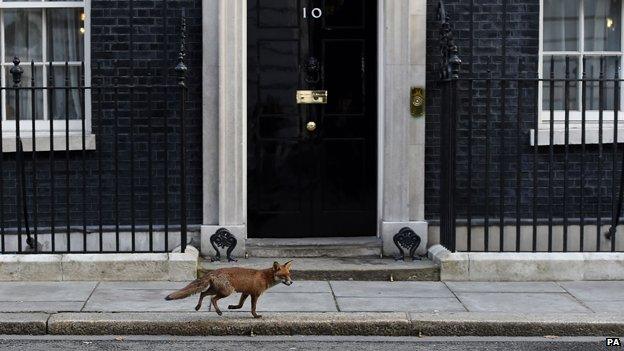
There will be lots of serious and considered political analysis in the aftermath of the 2015 general election. Here PJ O'Rourke offers something else.
"Accurate Predictions About Today, Delivered First Thing Tomorrow."
That should be the motto of the pollster, pundit, and reporter industry.
The British have voted Conservative - not by an overwhelming margin. But a "whelming" margin will do.
Go ahead, blame it on Scotland. In the once solidly red-rosette glens and braes and lochs and heather the Scottish National Party snatched the sporran, ripped the kilt off and walked away in the ghillie brogues of Labour.
Fears were had about a "support and supply" deal between Labour and the SNP allowing Labour to form a minority government that would swear it wasn't in a coalition with the SNP but would be up the Firth of Forth without a paddle lacking SNP votes.
Off-putting, I guess - the notion that Britain would, to a degree, be governed by a party that's opposed to British governance. As if the US had a governmental legislative body totally opposed to everything about the US president's government. Hmmm.
But beside the fact that the election's outcome seemed to come as a complete surprise to the electorate, there were other aspects of this election that baffled an American.
For one thing, telling the candidates apart. To American eyes and ears David Cameron, Ed Miliband, Nick Clegg and even Nigel Farage had the same accents, same suits, same gestures - four British Mitt Romneys. We too had a Mitt Romney, but we could tell him apart from Barack Obama.
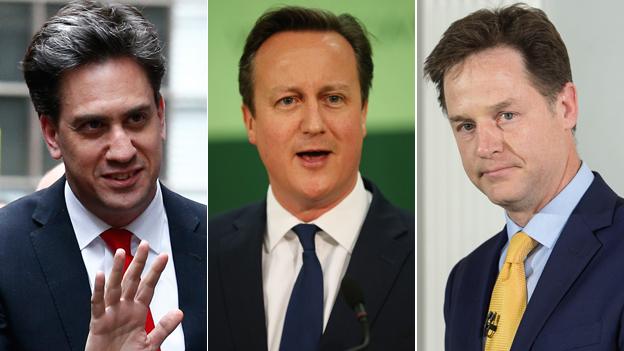
Miliband, Cameron and Clegg: A trio of Mitt Romneys?
Of course, I could tell the difference between the men and Nicola Sturgeon. Nicola bore a strong resemblance - not least in the demands she intended to make on Ed Miliband - to my ex-wife's divorce lawyer.
Also, what was with the SNP formerly being headed by a person called Salmond and now by a person called Sturgeon? Something fishy, an American suspects.
However, I visited Glasgow and liked the SNP supporters better than those of any other party. Not for reasons of political agreement. I'm what, if I were a Brit, you'd call a Countryside Alliance Tory bog-trotter.
Maybe it was the pan-Celtic craic. SNP backers were full of good cheer.
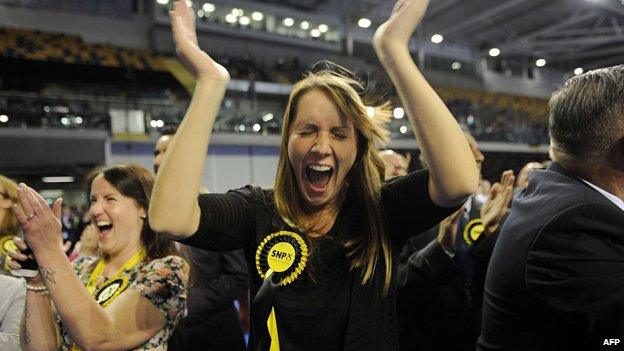
An SNP backer in good cheer
Everyone else was pretty glum. And for good reason.
The campaign slogans alone tell us why the major parties failed to ignite fiery public enthusiasm during the campaign:
Labour: "A better plan for a better future."
Conservatives: "A better future for you, your family and Britain."
Liberal Democrats: "The real alternative."
Conservatives were supposed to be in trouble because the economy was doing well - in no place except Southeast England. Turns out Brits weren't "all in it together" with the austerity programme.
Conservatives were also in trouble for vowing to cut social spending while refusing to say what social spending they'd cut.
Labour was in trouble for vowing to increase social spending while refusing to say where the money would come from.
Perhaps the money would come from a "mansion tax" on homes worth more than £2m. Trouble is, maybe you bought a little flat in Maida Vale for ten thousand quid in 1976. You're living in a mansion, mate.
And the Liberal Democrats were in trouble for being collared and leashed in coalition with the Conservatives. "Sit." "Stay." "Come." "Good doggies!"
Especially in the matter of Lib Dem promises to "beg" for lower tuition fees. Instead they played dead.
Conservatives looked as if they might lose votes to UKIP.
Labour did lose votes to the SNP.
Lib Dems lost votes to everyone.
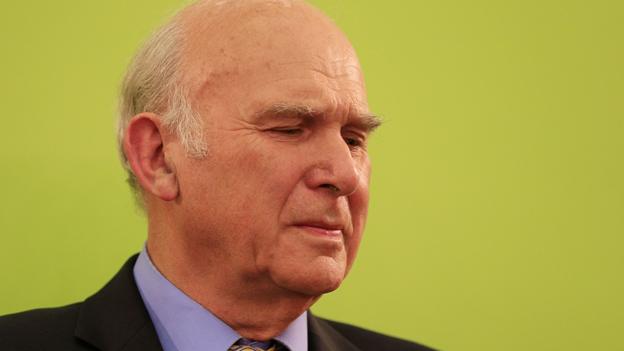
Vince Cable was among 49 Lib Dem MPs who lost their seat
And "major party" was a kind of courtesy title for the Lib Dems anyway. By membership, the SNP is the third largest political party in the UK.
Thus Britain's fate was, I thought, in the hands of what might be called the "major-minor" parties.
The Green party never polled well, running consistently last among the major-minors even though we Americans think of the UK as an ecology-besotted nature-lovey nation to the extent of even banning fox hunts (as a poultry owner, I tell you a fox is nothing but a rat in haute couture).
But these days every political party in the UK - UKIP perhaps excepted - mouths the "green" part of the Green platform.
The Greens were reduced to advocating such things as an across-the-board 10% reduction of public transport fares.
UKIP was the fashionable worry for a while. UKIP sometimes polled as well as Lib Dems and Greens put together.
A Conservative/UKIP coalition would - so fretting pundits told me - push the UK so far from Europe that the White Cliffs of Dover would never be visible from that continent again. And immigration would be limited to pasty-faced holders of multiple technical degrees whose parents had been born south of the River Tweed and east of Hay-on-Wye.
To be fair to UKIP, Nigel Farage did his best to emphasise the reasonable-sounding parts of the UKIP platform - is the EU perhaps a bad deal for Britain? Could the money the EU costs Britain be better spent elsewhere? But, from what I could tell by speaking to UKIP supporters, the party is, basically, a protest against modernity.
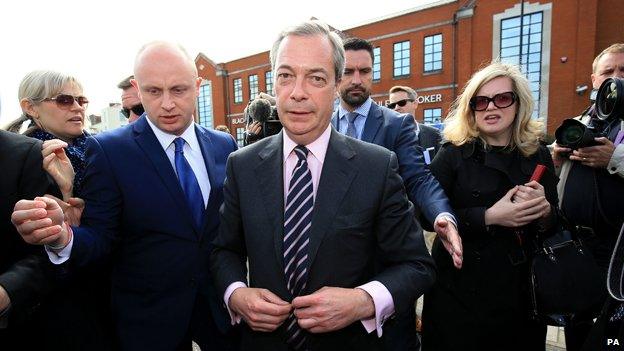
Nigel Farage waits for the election count in Thanet South
Meanwhile, I should have been paying more attention to the SNP. Why did the Scots decide against independence and then sign up in droves with the party that's for it?
Labour in particular was gravely perplexed by this "Scottish Question" and suffered grave consequences for its perplexity.
Labour, I have the answer to the Scottish Question right at home, although I'm afraid it's too late now.
You see, Labour, your party, like the Scots themselves, opposed independence. But...
I may say that my kid is immature, ignorant, uncoordinated and not ready to be out on his own in the world (he is a bit clumsy, has trouble remembering what nine nines are, and he's only 11, so I'm quite right). But if you call my kid a dopey young klutz, God help you.
But back to being baffled by your election.
The economy was touted as the biggest issue. Yet how much can politics control an economy?
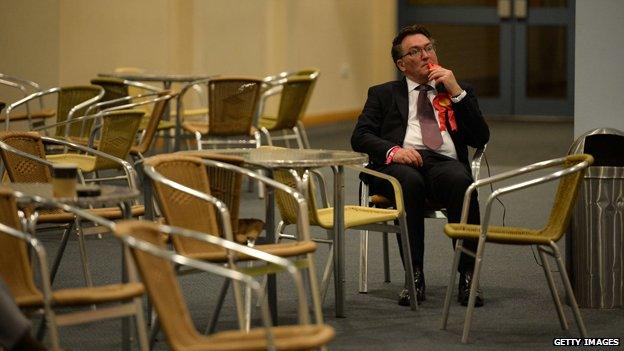
The Conservatives said they'd "create two million jobs." Can be done. Outlaw the Internet and hire two million people to run around with forked sticks delivering email messages.
Politicians can't predict the next purse-shattering economic event. We don't know what's about to happen that will change everything.
A sudden spike in global demand for haggis makes Dundee the tartan Dubai.
Or a collapse of the Chinese economy sends us all back to work in the dark, satanic mills making our own tracksuits and trainers.
Then there was the issue of taxes - higher rates, lower rates, imposts upon people whose houses were just too darn big. But nothing about the tax system.
Like the 20% VAT - a plain tax on the poor. Rich people save their money or invest their money or hide their money in the Cayman Islands. Poor people spend their money. And every time they do they get whopped with the VAT.
The NHS was an issue. Every party agreed that the NHS is brilliant, wonderful, a national treasure. But if the NHS is brilliant, wonderful and a national treasure, why was every party promising to fix it?
And national defence was hardly an issue at all. The SNP and the Greens did bring up Trident submarines, but only to ask them to take a dive. And UKIP suggested that the military taking the Queen's sixpence be given a ha'penny more.
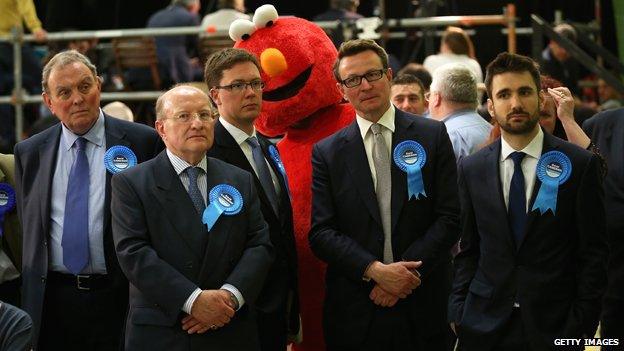
Otherwise...
True there's no Hitler, Mussolini or Tojo on the scene. But there's a fellow in Russia who'd be all three if he could. And he's got the bomb.
And has peace in the Middle East been achieved while I wasn't watching?
And China? Is China tired of sitting on the kiddie booster seat at the Axis of Evil table?
But it isn't any of my business. I'm not a Brit. I'm just a reporter from a distant land. I didn't have a dog in this fight. Or whatever the modern, sensitive, PC equivalent to that phrase is ("Didn't have any bacteria in this yoghurt"?). So I'll butt out now.
Your election is over. You've got the freely elected, lawful, democratic government that Great Britain is famous for. That, indeed, Great Britain invented.
And I hope Great Britain stays great and stays Britain in that Scotland doesn't get off Scot free followed by Wales, and Northern Ireland and Cornwall and Yorkshire and, I don't know, Stonehenge, leaving you the United Kingdom of the Queen and her corgis.
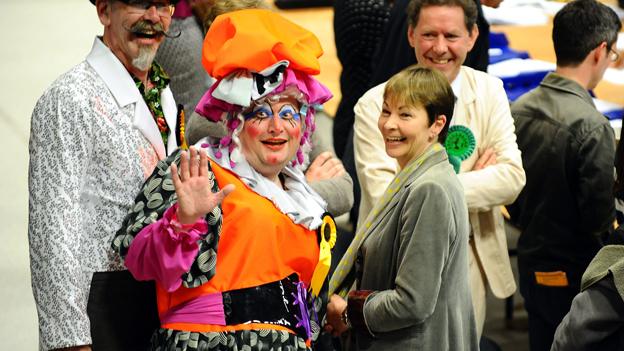
Green MP Caroline Lucas at Friday morning's election count
A Point of View is broadcast on Fridays on Radio 4 at 20:50 BST and repeated Sundays 08:50 BST or listen on BBC iPlayer.
Subscribe to the BBC News Magazine's email newsletter to get articles sent to your inbox.